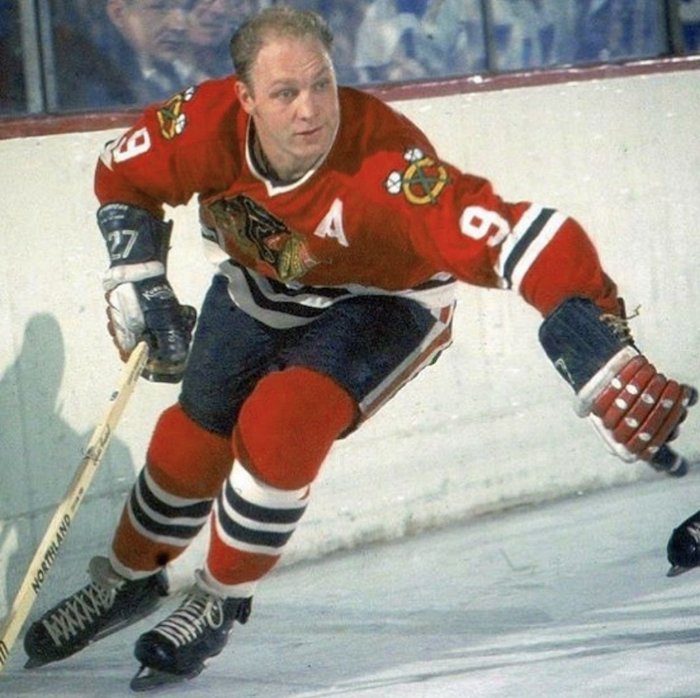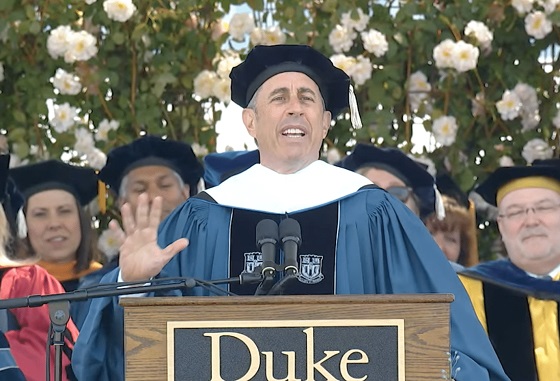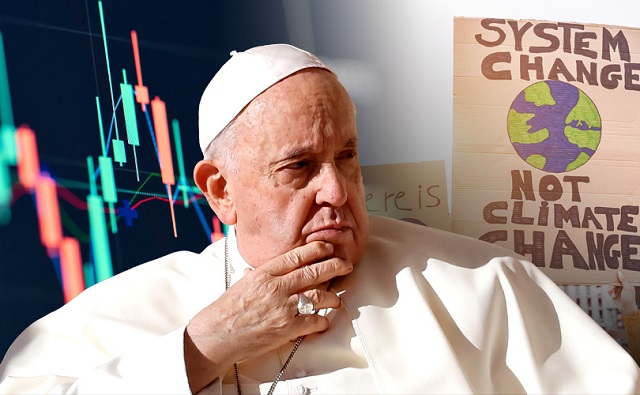Bruce Dowbiggin
Bobby Hull Was An Imperfect Icon. Some People Can’t Get Past That

“The evil that men do lives after them; the good is oft interred with their bones” —Julius Caesar, Shakespeare
Bobby Hull died last week at age 84. For several generations of hockey fans you don’t have to say Hall of Fame or legendary scorer or the man who popularized Stan Mikita’s curved stick blade. Or the man who launched the WHA by telling Chicago owner Bill Wirtz to go do something rude to his hat. Or Brett Hull’s dad. These things are baked in. Bobby Hull is enough to summon it all up.

To comprehend how brilliant he was just look at his doppelgänger today, Connor McDavid. That’s how much he was a force of nature in a game that tried to clutch and grab him, to slow him down, to get him off his game. He scored 913 regular season goals in the NHL and WHA (plus 179 in playoffs). That’s how you get the nickname The Golden Jet. He was an alpha man. And that makes some people uncomfortable these days.

But there’s more. There was another Bobby Hull I met while working on the story of the 1993 pension lawsuit filed by the former stars of the Original Six— like Hull, Gordie Howe and especially Carl Brewer— against the league that exploited them for pitiful pensions. (You can read about it in my book The Defence Never Rests at brucedowbigginbooks.ca.)
Bobby was not among those doing the grunt work on the legals, but he understood the power of his name— and Howe’s and Frank Mahovlich’s— in backing the lawsuit, appearing in court and speaking out on my CBC TV show about how he and Howe were worth more than the $13,500 a year pensions the league gave them. When those men sat in the courtroom, staring at the judge, the Crown understood this was no crank complaint against the league.
Hull didn’t have to do these things. It would have been easier, safer, if, like other retired NHLers, he stayed away to protect some pathetic sinecure they had with the league. It was what an alpha man does. And Bobby was an alpha man in every sense— for both good and not good.

As fans will tell you, Bobby was legendary for his charm, signing autographs and remembering the ordinary people he met. For example, ten years later I passed him sitting in the lounge of the Calgary airport and, with a smile, he growled, “I was wondering how %$@*^ long it would take you to come up here.” I gave him a copy of my latest book Money Players— about the labour history of hockey players like Hull— to read on the plane we were both taking to Chicago.

At the other end in Chicago he asked me to walk him to his flight for his winter home in Sarasota. His knees were killing him, but he didn’t want anyone to know. I’ll never forget walking together with Bobby— his hand on my shoulder— through O’Hare to his gate for a flight. The rapturous looks from his fans seeing a Chicago legend on a par with Gale Sayers or Ernie Banks. Holding himself erect when his body was pain-racked. The smile. His firm handshake as we got the gate, saying “Thanks for walking with me, pal.” He was very real.
And that means that the kind of people who revel in these things immediately sprung into action about Bobby’s failings. A domestic assault in the 1960s. Questionable quotes to a Russian journalist about the Nazis. His penchant for being the last guy to leave a party. One online troll called him “a terrible person”.
They’re entitled to their opinion. As Marc Antony said of Caesar, Yet Brutus says he was ambitious; And Brutus is an honourable man.”
I’ll let Bobby’s grandson Jude make the point. Jude Hull: You’re allowed to have whatever opinion you want of my Grandfather and his past. To air it all out not 12 hours after he passed makes me want to puke. I hope those tweets help you sleep better at night.”
Indeed. The usual suspects wallowing in Hull’s personal failings from 60 years ago are the first jacknapes who conveniently skirt JFK’s moral failings because he was a Camelot liberal like them. Who gave murderer Teddy Kennedy a pass in the U.S. Senate for 50 years because he played for their team. Who soft-pedal Martin Luther King’s serial infidelities, because he had other work to do in their narrative.

Like them, Bobby was a man of his times with failings. Ones he owned. But he was also a colossus as a cultural figure. Imagine if all the actors, athletes, musicians and artists we revere today were purged for their moral failings, their addictions, their infidelities, their chumminess with tyrants, their racial attitudes. There wouldn’t be many left, would there? Why does David Crosby get a loving obit but the same people slime Bobby Hull.
So, sure, list Bobby Hull’s failings. Dig deep into them to make a point about the kind of alpha male who rarely exists anymore. And how much more virtuous you are sitting at your keyboard spilling garbage incognito. List those who third-hand get the vapours from seeing everything he did as a victim culture thing.

In a world that needs a smile, wants a distraction from the awfulness of a bureaucratic existence, Bobby Hull distributed happiness by the ton. He changed the business of hockey to make it a better livelihood for players by going to the WHA, supporting NHLPA reform. He showed up. His HOF son Brett said his father gave his family and others “a tremendous amount of great memories…Those of us who were lucky enough to spend time with him will cherish those forever.”
“The noble Brutus hath told you Caesar was ambitious:
If it were so, it was a grievous fault, And grievously hath Caesar answer’d it.”
Sign up today for Not The Public Broadcaster newsletters. Hot takes/ cool slants on sports and current affairs. Have the latest columns delivered to your mail box. Tell your friends to join, too. Always provocative, always independent. https://share.hsforms.com/16edbhhC3TTKg6jAaRyP7rActsj5
Bruce Dowbiggin @dowbboy is the editor of Not The Public Broadcaster A two-time winner of the Gemini Award as Canada’s top television sports broadcaster, he’s a regular contributor to Sirius XM Canada Talks Ch. 167. Inexact Science: The Six Most Compelling Draft Years In NHL History, his new book with his son Evan, was voted the seventh-best professional hockey book of all time by bookauthority.org . His 2004 book Money Players was voted sixth best on the same list, and is available via http://brucedowbigginbooks.ca/book-personalaccount.aspx
Bruce Dowbiggin
Jerry Came to See The Babies. And They Walked Out On Him

Cometh the hour, cometh the comedian. Or, you can learn a lot about a demographic by what makes them laugh.
The legacy/ lunacy media schvitzed itself over a few furious sociology majors and look-at-me drama queens walking out on Jerry Seinfeld’s commencement address at Duke University last weekend. But the significance of his admission that he was 70 was probably far more newsworthy to those now in retirement, binge-watching his eponymous TV series on one of those down-the-dial channels.
If we had a dollar for every Boomer who said, “Seinfeld is 70?” while watching the address we’d be Warren-Buffett-rich this morning. He doesn’t look like any 70 year olds we know. Fifty? Maybe. But listening to his familiar delivery, the mocking on his honorary degree costume, it was easy to believe that we, too, are much younger than our blood-thinner prescriptions say.
It also pointed out the evolution of Boomers’ comedic tastes. When they came of age in the late 1960s/ early 1970s Woody Allen best profiled as his generation’s comedic muse. With a dozen classic movies ranging from What’s New Pussycat (1965) through Play It Again Sam (1972) to Annie Hall (1977) Allen’s self-deprecating nebbish captured the romantic/ridiculous self-image of Boomers with “Some drink deeply from the river of knowledge. Others only gargle”.

The neurotic, insecure Allen then decided to become Ingmar Bergman, and Boomers— now assembling jobs, children and first spouses— moved on. But for that 12-year span the bedraggled standup comedian was the go-to with lines like “Just because you’re paranoid doesn’t mean they aren’t out to get you” and “The only love that lasts is unrequited love.”
Woody’s pointed contemporary political references in those years were few (conflating “D’you” for “Jew” with Tony Roberts in Manhattan) and self-deflating (see Annie Hall). His most prominent political jabs were framed in absurdist material like Love And Death and Bananas. Culturally he was merciless but affectionate about his Brooklyn upbringing. In short his were perfect date movies for Boomers seeking love to advertise their pretensions.
Flash forward from Woody to Seinfeld (created with Larry David) which was anti-romantic in the extreme. The characters were sociopaths. The situations often cringeworthy. The 24-minute formula harkened back to Lucy and the Honeymooners. And while schlock like Friends trod the same ground it was Seinfeld that somehow captured the Boomer zeitgeist.
Why? Boomers going through middle age were too disillusioned with how life was turning out to romanticize anymore. The self-obsessed characters were people they knew from work, school and dealing with government. Smirking Bill Clinton was the face of an era. “When we did my show in the 90s, it was so easy to make fun of things. It was so easy,” Seinfeld told Amy Schumer.
Significantly, Seinfeld the Show was cultural. Or quasi-cultural. It was never about politics per se. It was about the people who thwart you in life. Whose vanity ruins your plans from school days. Who go 50 mph in the left lane. “When is Jerry going to see the baby?” It rarely challenged its fans on an emotional level. It was mostly about navigating madness.
And often about the most mundane elements of life. The address on the weekend contained The Seinfeld Doctrine of Lowered Expectations. “It’s easy to fall in love with people. I suggest falling in love with anything and everything, every chance you get. Fall in love with your coffee, your sneakers, your blue zone parking space. I’ve had a lot of fun in life falling in love with stupid, meaningless physical objects.
“The object I love the most is the clear-barrel Bic pen — $1.29 for a box of 10. I can fall in love with a car turn signal switch that has a nice feel to it, a pizza crust that collapses with just the right amount of pressure. I have truly spent my life focusing on the smallest things imaginable, completely oblivious to all the big issues of living.”
Reaching across the generations Seinfeld delivered Dad jokes and bromides to kids who education probably cost $100 K a year. “I think it is also wonderful that you care so much about not hurting other people’s feelings in the million and one ways we all do that,” he said. Then he explained why that might be a fruitless pursuit. Not in Curb Your Enthusiasm darkness. But sobering.
That’s why it was in character for him to let the furious demonstrators depart at Duke without comment. So was appearing at Duke, the Ivy League of Tobacco Road, founded by the people who made jillions selling nicotine. And why he let them garb him like Thomas Cromwell in the absurd 16th century cape and hat so he could score few laughs.

Because laughter is his means of dealing with jerks like the outbound Hamas crowd. “What I need to tell you as a comedian: Do not lose your sense of humour. You can have no idea at this point in your life how much you are going to need it to get through. Not enough of life makes sense for you to be able to survive it without humour.”
Yes, He has been vocal lately about the effect of political correctness ruining TV comedy. Drawing flak from former friends and fans who are in the Biden re-education camps at the moment. But his annoyance at ruining an art form far outweighed any complaints about Covid and Ukraine.
As opposed to the nihilism of his former partner David, his insouciance and comic patter represent an antidote for where most of his original fans are at the moment. Woody Allen, their former idol, is now seen as a pedo and a failed nouveau vage auteur. Disillusioned with virus lies, electoral shenanigans and soaring prices, Boomers on a pension are unanchored, floating through what used to be North American society (when only women had babies).
In fact, Boomer spectators watching Seinfeld’s 17-minute speech maybe summed it up for themselves by recalling the Seinfeld mantra, “It was a show about nothing.” And they’d be right. Jerry is the man for those times.
Bruce Dowbiggin @dowbboy is the publisher of Not The Public Broadcaster A two-time winner of the Gemini Award as Canada’s top television sports broadcaster, he’s a regular contributor to Sirius XM Canada Talks Ch. 167. Now for pre-order, new from the team of Evan & Bruce Dowbiggin . Deal With It: The Trades That Stunned The NHL & Changed Hockey. From Espo to Boston in 1967 to Gretz in L.A. in 1988 to Patrick Roy leaving Montreal in 1995, the stories behind the story. Launching in paperback and Kindle on #Amazon this week. Destined to be a hockey best seller. https://www.amazon.ca/Deal-Trades-Stunned-Changed-Hockey-ebook/dp/B0D236NB35/
Bruce Dowbiggin
Why Do The Same Few Always Get The Best Sports Scoops?

The Toronto Maple Leafs made the “what colour is that green light?” decision to fire their head coach Sheldon Keefe last week. The removal of Keefe after five years followed a dispiriting first-round playoff series loss to a very ordinary Boston Bruins team. Coaching may or may not have been the root cause of that loss. (Keefe himself admitted “teams are waiting for the Leafs to beat themselves”.)
The real reason for the firing is 1967, and we don’t think we need add more than that.
In essence, the management of MLSE— the owner of the Maple Leafs and a lot of other sports stuff in Toronto— needed to throw a body to the baying hounds of disappointment. Also known as Leafs Nation. Newly minted CEO Keith Pelley, fresh from the PGA Tour/ LIV psychodrama, was certainly not going to pay the price.
Nor was GM Brad Treliving who has only been on the job for two seasons. The key decisions on Toronto’s lopsided salary cap were decided long before Treliving occupied his desk. That left two people in vulnerable positions. 1) Maple Leafs president Brendan Shanahan, who has been drawing an MLSE cheque for a decade. 2) Keefe.
When was the last time you saw a coach fire a team president? Precisely. Keefe joins the list of (briefly) unemployed coaches who circulate in the NHL like McKinsey consultants. Shanahan gets a lukewarm mulligan from Pelley. But after the failure of the Kyle Dubas experiment— “who needs experience?”— and now just a single playoff series win in a decade Shanny’s best-before date has arrived.

Toronto Maple Leafs president Brendan Shanahan attends a news conference in Toronto on April 14, 2014. Toronto Maple Leafs president Brendan Shanahan said Peter Horachek will remain the team’s interim head coach until the end of the season. Shanahan met the media Friday for the first time since coach Randy Carlyle was fired on Tuesday. THE CANADIAN PRESS/Chris Young
Depending on who he and Treliving enlist to coach— remember, Mike Babcock was too tough and Keefe was probably too player friendly— it had better produce instant results. Because Shanny, the pride of Mimico, is out of chances. The coach choice will also be affected by whichever player or players that management decides are superfluous to ending the Leafs’ ridiculous run of misery.
The Leafs brass’ press conference last Thursday did little to shed light on what happens after Keefe’s expulsion. Just a lot of MBA determinism on a bed of baffle gab. A crabby Steve Simmons question/rant briefly threatened the harmony of the moment, but order was restored. And the media bitching switched from the press box to social media and podcasts.
Speaking of the fourth estate, the other unmentioned aspect of this story— indeed every story in the NHL these days— is just how it was revealed to the public. When people sipped their morning Tim’s or Starbucks the (almost) coincident bulletins came down the social media pike about Keefe’s dismissal.
Predictably, Chris Johnston of Sportsnet and Daren Dreger of TSN announced the breaking news within heart beats of each other. While there had been speculation on Keefe’s fate for days, the announcement coming from the networks duo confirmed the story in the minds of the industry. That allowed everyone else drawing a cheque as a hockey journalist to pile in and swarm the dead body.
In today’s sports journalism, where social media has replaced newspapers, scoops are governed by a protocol. There are the heralds— in the NHL it’s currently Johnston and Dreger— and then there are the disseminators. The days of a rabble of reporters all scrambling to get a story bigger than who-will-play-in-tonight’s-game are gone. Today, it’s a very narrow funnel for scoops.
It’s the same in the NFL where Ian Rappaport (NFL Network) and Adam Schefter (ESPN) monopolize the tasty scoops on behalf of their employers, who also happen to be NFL rights holders. In the NBA, Brian Windhorst (ESPN) has the inside rail when it comes to the LeBron James/ Steph Curry scoops. In MLB… it’s probably Ken Rosenthal (The Athletic) but no one cares about baseball anymore, do they?
The leagues like it this way, doling out stories to guys they can trust. None of this is criticism of Johnston or Dreger, who have deftly maneuvered themselves into the coveted “from their lips to your ears” spots. From our own experience we can remember the exhilaration of having the best source or sources on the really big stories. Like Johnston/ Dreger, we worked hard for a long time to develop those sources and only very reluctantly let anyone else horn in on our stories.
It was also our observation that this order of things journalistic suited a lot of reporters who either couldn’t get good sources or didn’t want the stress of being first on stuff. It was enough that, like the Keefe story, they’d get the goods eventually and most fans would not care who was first. So long as you had a take. So be it.
Some resentful types took potshots at our work if it upset their pals in the dressing room or the management suite. On the Stephen Ames/ Tiger Woods story in 2001, we had the late Pat Marsden tell us on air that we’d done a great job on Ames’ criticisms of Tiger. Only to hear him lambaste us— again on FAN 590— only minutes later as we listened driving home from the studio. But we digress.
Many reporters are complacent in playing the game, so long as their bosses didn’t enquire why they are getting scooped all the time by the same few rivals. With the death of daily newspapers that doesn’t happen much any longer. (Many editors today may only see stories when publication brings a libel notice.) For them a salty take is good enough.
The scoop business is also affected by the multiple roles now demanded of sports media types. In addition to their “day job” on a beat they also have to supply digital content and talk-back hits to the Mother Ship. Most also are feeding a weekly podcast, dictating time on air rather than time working the phone. There are only so many hours in a day to chase a story.
Better to play the Breaking News waiting game.
Bruce Dowbiggin @dowbboy is the publisher of Not The Public Broadcaster A two-time winner of the Gemini Award as Canada’s top television sports broadcaster, he’s a regular contributor to Sirius XM Canada Talks Ch. 167. Now for pre-order, new from the team of Evan & Bruce Dowbiggin . Deal With It: The Trades That Stunned The NHL & Changed Hockey. From Espo to Boston in 1967 to Gretz in L.A. in 1988 to Patrick Roy leaving Montreal in 1995, the stories behind the story. Launching in paperback and Kindle on #Amazon this week. Destined to be a hockey best seller. https://www.amazon.ca/Deal-Trades-Stunned-Changed-Hockey-ebook/dp/B0D236NB35/
-

 conflict2 days ago
conflict2 days agoWhite House Reportedly Worried About Russia’s Sudden Momentum Months After Biden Declared Putin ‘Already Lost’ War
-

 Crime1 day ago
Crime1 day agoThe US Canadian border: Greatest number of terrorist watch list individuals being apprehended at northern border
-

 COVID-191 day ago
COVID-191 day agoNIH Quietly Altered Definition For Gain-Of-Function Research On Its Website, Former Fauci Aide Confirms
-

 Economy12 hours ago
Economy12 hours agoCanadians experiencing second-longest and third steepest decline in living standards in last 40 years
-

 Energy1 day ago
Energy1 day agoPope Francis calls for ‘global financial charter’ at Vatican climate change conference
-

 Bruce Dowbiggin1 day ago
Bruce Dowbiggin1 day agoJerry Came to See The Babies. And They Walked Out On Him
-

 Great Reset13 hours ago
Great Reset13 hours agoBiden Administration Eager to Sign WHO Pandemic Treaty
-

 Opinion16 hours ago
Opinion16 hours agoOrdinary working Canadians are not buying into transgender identity politics






